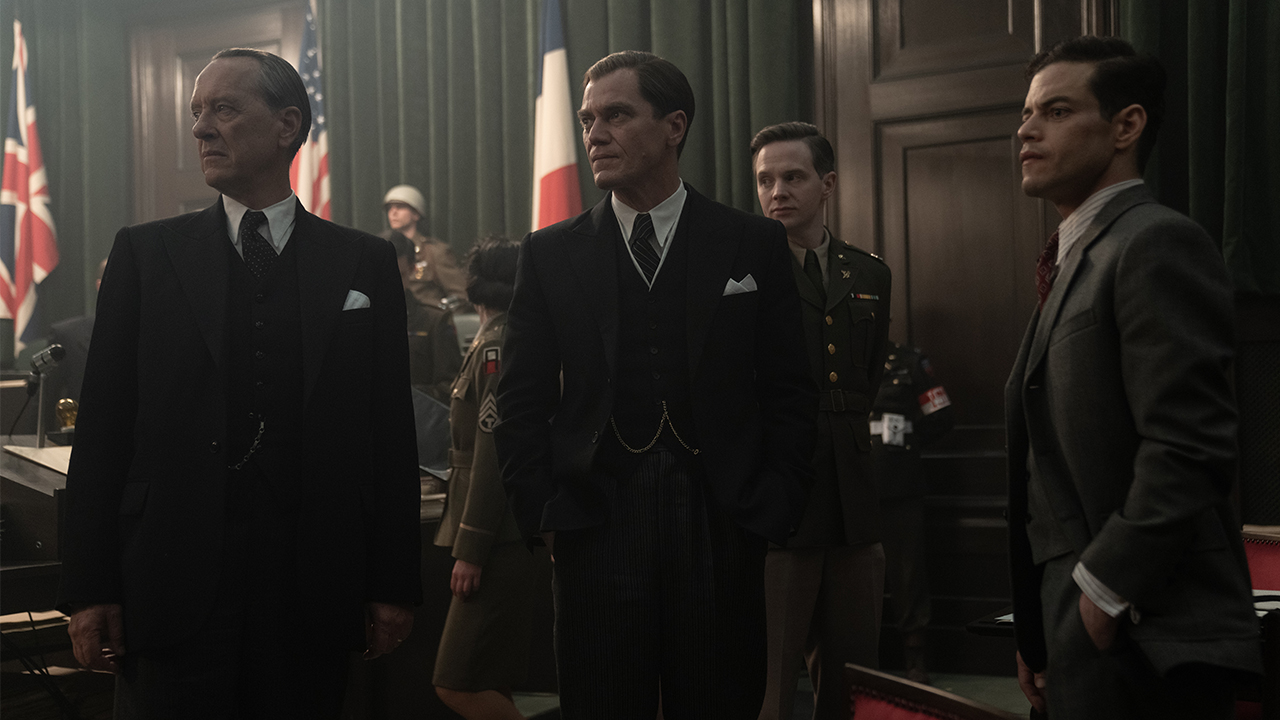The Nuremberg Trials were one of the most pivotal moments of the 20th century. On the heels of World War II, the Allies, for the first time in history, would put the aggressors of that war on trial for those aggressions, the Holocaust, and their crimes against humanity. The trials, especially the first trial that condemned the highest-ranking Nazis still living after the war, set precedents that are still in use today in international law. Nuremberg, from writer/director James Vanderbilt and starring Russell Crowe as the infamous Nazi Hermann Göring and Rami Malek as a psychiatrist studying the imprisoned war criminal, isn’t going to set any precedents.

Release Date: November 7, 2025
Directed By: James Vanderbilt
Written By: James Vanderbilt, based on a book by Jack El-Hai
Starring: Russell Crowe, Rami Malek, Michael Shannon, Richard E. Grant, John Slattery, Leo Woodall
Rating: PG-13 for violent content involving the Holocaust, strong disturbing images, suicide, some language, smoking and brief drug content
Runtime: 148 minutes
The 2-hour and 28-minute movie really struggles to find its tone throughout. On one hand, it’s a pretty traditional courtroom drama. It’s also a psychological drama exploring the depths of humanity’s ability to be evil and justify it to oneself. It’s also, weirdly, a sort of adventure story that at times feels like it would fit into the Indiana Jones franchise.
This problem starts from the beginning. There are a lot of one-liners and snappy jokes that feel completely out of place for the subject matter. Making fun of Nazis and making them cartoonish, like Indiana Jones movies do, is great in the right context. But a study of how evil the Nazis were during the war and in implementing “The Final Solution of the Jewish Question” is not the time to slip in jokes. Yet, there are a bunch of them here, and it frankly made me squirm every time one was delivered.
The first act of Nuremberg is far too playful.
Supreme Court Justice Robert Jackson, played here by Michael Shannon, was the chief prosecutor for the United States at the trial. By most accounts, Jackson was a serious man who took his duty at the trial solemnly and soberly. In Nuremberg, he’s often jokey, and that makes it difficult to take him seriously when he’s not. It’s a contrast that is impossible to reconcile. One-liners and hard cuts feel so out of place here; it makes you want to scream.
Meanwhile, Malek’s character, Dr. Douglas Kelley, seems to be off on his own separate adventure. His motivations are self-serving, as he intends to write a book about his interviews with the most notorious Nazis, especially Göring. More often, though, he’s just off on a jaunt through post-war Germany, speeding around in Jeeps and getting drunk in nightclubs with beautiful journalists. His character wouldn’t be out of place in a jaunty ‘60s war movie like The Great Escape or The Dirty Dozen. Sure, there is devastation all around us, but hey, let’s go have some fun in Europe!
Kelley’s constant bickering with the commandant of the prison holding the war criminals, Burton C. Andrus (John Slattery), borders on the absurd, with both men firing one-liners back and forth. At the same time, he’s combative in a far too self-serious way with another psychiatrist on the team, Gustave Gilbert (Colin Hanks). These two contrasting relationships again highlight how the film doesn’t strike a consistent tone. It’s enough to give any viewer whiplash.
The second half almost saves the movie.
Finally, once we arrive at the second act, the movie becomes what it should have been all along: a tense courtroom drama. When the prosecutors play films of the concentration camps, it carries the weight that it should. There are no more jokes, no more asides, and no more adventures; it’s a cold and brutal look at the Nazi atrocities and those responsible for them.
Your Daily Blend of Entertainment News
It's when Göring takes the stand that the movie finally shines. Shannon and Crowe are excellent as prosecutor and accused pitted against each other. We know from history just how this all plays out, and the movie stays true to that history, but Vanderbilt still builds the tension as the testimony unfolds. Göring is cocky at first, as he was in real life, before it all falls apart after only one question from British prosecutor Sir David Maxwell Fyfe (Richard E. Grant) in the film's best moment.
After all the uncomfortable playfulness of the first act, the movie settles into a seriousness that the subject matter demanded all along. The crowd I saw it with was completely silent for the final 45 minutes of the movie, as the jokes finally faded away, and the gravity of the crimes took hold. It’s a story most know, but that doesn’t lessen the impact of the real footage of the concentration camps, or the earnestness of the prosecutors in the trial. Even when Göring is charming, and he is at times, we aren’t allowed to forget how evil he is. That’s what was needed for the whole film, not just the final third of it.
The end of the film makes the beginning more disappointing
Nuremberg leaves the viewer asking why the whole movie didn’t strike the same tone as the trial scenes. It certainly left me wanting much more from the film. Instead, the movie misses the notes for far too long for the tense testimony of Göring to redeem it. The dramatization isn’t going to add much to the historical record, either, as the conversations between the Nazi Reichsmarschall and Kelley are truly fascinating, but ultimately fall flat.
The film makes a final point to show that the Nazis were just humans. Humanity at its worst, yes, but treating them as an anomaly discounts the possibility that something as evil as that regime could ever happen again. There is a clunky political message in there, but more than that, it's important to always remember that humans have a great capacity for wicked depravity. To forget that is to ignore the past and take the future for granted. If only the movie held that ideal throughout.
It’s impossible to make a man like Hermann Göring sympathetic, and it's probably not a great idea to try to, but Crowe does find a twisted sense of humanity in him. Unfortunately, the rest of the film doesn’t take itself seriously enough to make it stick.

Hugh Scott is the Syndication Editor for CinemaBlend. Before CinemaBlend, he was the managing editor for Suggest.com and Gossipcop.com, covering celebrity news and debunking false gossip. He has been in the publishing industry for almost two decades, covering pop culture – movies and TV shows, especially – with a keen interest and love for Gen X culture, the older influences on it, and what it has since inspired. He graduated from Boston University with a degree in Political Science but cured himself of the desire to be a politician almost immediately after graduation.
You must confirm your public display name before commenting
Please logout and then login again, you will then be prompted to enter your display name.

